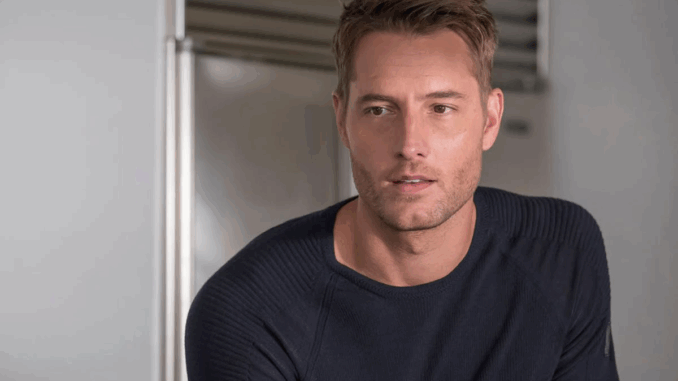
In 2019, Justin Hartley’s name wasn’t trending for his acting — it was trending for his divorce. Overnight, the This Is Us heartthrob went from being one of television’s most beloved men to a target of social media outrage, reality TV drama, and endless speculation. Everyone had an opinion. Everyone thought they knew his story.
But no one — not even his harshest critics — could have predicted what came next.
Instead of fighting back in tabloids or trading public barbs with his ex, Hartley went silent. For over a year, he barely gave interviews, avoided red carpets, and refused to engage with the chaos. His disappearance baffled Hollywood. Agents whispered that he was “finished.” Pundits said he’d “never shake off the bad press.”
They were wrong.
Because that silence? It wasn’t defeat — it was strategy.
Behind the scenes, Hartley was rebuilding everything. Friends close to the actor describe that period as “his transformation era.” He poured himself into work, saying yes to fewer things but demanding more meaning from every project. Gone were the days of playing secondary characters or love interests. Hartley wanted something grittier, something that mirrored what he’d lived through: survival, redemption, control.
That’s when Tracker came along — and everything changed.
The show’s premise, about a man haunted by his past while tracking down lost people across America, hit uncomfortably close to home. According to insiders, Hartley connected with the emotional depth of Colter Shaw immediately. “He understood the loneliness of the character,” one writer revealed. “A man who’s trying to make sense of chaos while pretending he’s fine. That was Justin, right after his divorce.”
He didn’t just star in Tracker — he shaped it. Sources say Hartley was deeply involved in tone meetings, character rewrites, and even editing. He wanted the show’s core message — that pain can be turned into purpose — to reflect his own rebirth.
It worked. Tracker didn’t just become a hit — it became a personal triumph.
Hollywood suddenly had to reframe its narrative: the man who’d been painted as the villain in someone else’s story had quietly rewritten his own. No public feuds, no scandal-fueled comebacks, just pure, undeniable success.
And that’s the real twist — Justin Hartley’s revenge was never about proving people wrong; it was about proving himself right.
In a city obsessed with gossip, his decision to stay silent wasn’t weakness — it was power. While everyone else talked, he built. While others tweeted, he filmed. When his name became clickbait, he turned it into a brand built on talent, not controversy.
“He played the long game,” said one CBS executive. “Hollywood forgot — then he reminded them who he was.”
Even now, Hartley doesn’t address the scandal directly. He doesn’t need to. The success of Tracker speaks louder than any interview ever could. His fans didn’t just return — they multiplied. They saw in him what Hollywood rarely allows: a man who fell apart publicly and rebuilt privately.
Today, Justin Hartley stands as one of TV’s most respected leading men — a title earned not by escaping chaos, but by mastering it. And maybe that’s why audiences connect with him so deeply: not because he’s perfect, but because he’s proof that you can lose everything, and still win.
So yes, Justin Hartley’s divorce was messy. But his comeback?
It’s immaculate.